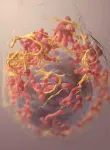(Press-News.org) Why do people living in democratic countries vote for political candidates who openly violate democratic standards? A new study by a University of Notre Dame researcher found that diverse understandings of democracy among voters can lead to votes for authoritarian-leaning political leaders.
“A considerable variety in democratic views leads part of the electorate to overlook violations of democratic norms such as minority rights protection or restraints on executive power,” said Marc Jacob, assistant professor of democracy and global affairs at Notre Dame’s Keough School of Global Affairs. “These varied attitudes represent an important vulnerability for the democratic system as they can enable authoritarian political candidates to access and retain power.”
The study, which was published in the British Journal of Political Science, found that voters' differing conceptions of democracy shape their ability to recognize democratic violations and, in turn, affect their voting choices.
Jacob and co-authors Natasha Wunsch of the University of Fribourg, Switzerland, and Laurenz Derksen of ETH Zurich conducted a candidate choice experiment in Poland, a democracy where elections remain competitive despite some democratic backsliding over the past several years. (Democratic backsliding occurs when existing democracies slip backward toward autocracy and is currently taking place in every region of the world.)
The researchers found that respondents who supported democracy in principle but adhered less strongly to liberal democratic norms, such as minority rights protection and constraints on executive power, tolerated democratic violations more readily.
“Where liberal democratic commitment is weak or unevenly distributed across the electorate, voters cannot reliably act as safeguards against democratic backsliding,” Jacob said.
Conversely, voters who subscribed more strongly to a liberal understanding were more likely to vote against non-liberal candidates, even those from their own political party.
Jacob said that additional survey-based research and qualitative approaches such as focus groups may provide further insights into citizens’ divergent understandings of democracy. To counter further democratic backsliding, the researchers recommend extensive and deliberate investment in civic education of citizens that highlights how each individual benefits from democratic governance, especially in more recent democracies.
“Democracy education often features big, abstract ideas, but it’s just as important to show people how civil liberties, power-sharing and the rule of law directly benefit them — and to remind them that their votes play a crucial role in keeping those values alive.”
The study was funded by the Swiss National Science Foundation.
Contact: Tracy DeStazio, associate director of media relations, 574-631-9958 or tdestazi@nd.edu
END
Diverging views of democracy fuel support for authoritarian politicians, Notre Dame study shows
By Renée LaReau
2025-03-18
ELSE PRESS RELEASES FROM THIS DATE:
Bacteria invade brain after implanting medical devices
2025-03-18
CLEVELAND—Brain implants hold immense promise for restoring function in patients with paralysis, epilepsy and other neurological disorders.
But a team of researchers at Case Western Reserve University has discovered that bacteria can invade the brain after a medical device is implanted, contributing to inflammation and reducing the device’s long-term effectiveness.
The groundbreaking research, recently published in Nature Communications, could improve the long-term success of brain implants now that a target has been identified to address.
“Understanding the role of bacteria in implant ...
New platform lets anyone rapidly prototype large, sturdy interactive structures
2025-03-18
CAMBRIDGE, MA – Prototyping large structures with integrated electronics, like a chair that can monitor someone’s sitting posture, is typically a laborious and wasteful process.
One might need to fabricate multiple versions of the chair structure via 3D printing and laser cutting, generating a great deal of waste, before assembling the frame, grafting sensors and other fragile electronics onto it, and then wiring it up to create a working device.
If the prototype fails, the maker will likely have no choice but to discard it and go back to the drawing board.
MIT researchers have come up with a better way to iteratively design large and sturdy ...
Non-genetic theories of cancer address inconsistencies in current paradigm
2025-03-18
It’s time for researchers to reconsider the current paradigm of cancer as a genetic disease, argued Sui Huang from the Institute for Systems Biology, USA, and colleagues in a new essay published March 18th in the open-access journal PLOS Biology.
The prevailing theory on the origin of cancer is that an otherwise normal cell accumulates genetic mutations that allow it to grow and reproduce unchecked. This paradigm has driven large-scale cancer genome sequencing projects, such as The Cancer Genome Atlas, to identify cancer-driving mutations ...
Food and non-alcoholic drink products in Mexico were substantially reformulated to be healthier following the 2020 introduction of warning labels identifying products with excessive content of calorie
2025-03-18
Food and non-alcoholic drink products in Mexico were substantially reformulated to be healthier following the 2020 introduction of warning labels identifying products with excessive content of calories, fat, salt, sugar, sweetener and caffeine
In your coverage, please use this URL to provide access to the freely available paper in PLOS Medicine: http://journals.plos.org/plosmedicine/article?id=10.1371/journal.pmed.1004533
Article title: Product reformulation in non-alcoholic beverages and foods after the implementation ...
Conservation efforts are bringing species back from the brink, even as overall biodiversity falls
2025-03-18
A major review of over 67,000 animal species has found that while the natural world continues to face a biodiversity crisis, targeted conservation efforts are helping bring many species back from the brink of extinction.
The study draws on data from the IUCN Red List, the world’s largest database of species conservation status. The researchers say their results, reported in the journal PLOS Biology, highlight both the successes and the need for urgent action.
The world is facing a global biodiversity crisis, with 28% of more than 160,000 assessed species threatened with extinction, and an estimated one million species facing this fate due to human activities. ...
Conservation efforts analysis reveals which actions are most helpful for endangered species status
2025-03-18
Targeted conservation actions are essential to prevent wildlife extinctions, but more efforts are needed to fully recover biodiversity, according to a study published March 18th in the open-access journal PLOS Biology by Ashley Simkins of the University of Cambridge, UK and colleagues.
Out of over 166,000 species assessed by the International Union for Conservation of Nature, around 28% are threatened with extinction. Global efforts to prevent extinction and recover biodiversity have had some success, but there is limited data to show which conservation actions are most effective. In this study, Simkins and colleagues compile information ...
JSCAI special issue explores the transformative role of artificial intelligence in interventional cardiology
2025-03-18
WASHINGTON —The Journal of the Society for Cardiovascular Angiography & Interventions (JSCAI) proudly announces the publication of a groundbreaking special issue: The Role of Artificial Intelligence in Cardiovascular Interventions.
This issue explores how artificial intelligence (AI) is revolutionizing interventional cardiology, from diagnostic precision to procedural planning and patient outcomes. It features a collection of original research, reviews, and viewpoints that delve into AI’s applications across ...
Wayne State University research making strides in autonomous vehicle and machine systems to make them safer, more effective
2025-03-18
DETROIT — A grant to Wayne State University from the National Science Foundation (NSF) is opening new doors for researchers and students to explore the future of autonomous vehicles, machines and drones.
Zheng Dong, Ph.D., assistant professor of computer science in Wayne State’s School of Engineering, was awarded a five-year, $595,611 NSF grant for the project, "CAREER: ChronosDrive: Ensuring Timing Correctness in DNN-Driven Autonomous Vehicles with Accelerator-Enhanced Real-Time SoC Integration."
“We ...
Thorny skates come in snack and party sizes. After a century of guessing, scientists now know why.
2025-03-18
When Jeff Kneebone was a college student in 2002, his research involved a marine mystery that has stumped curious scientists for the last two decades. That mystery had to do with thorny skates in the North Atlantic. In some parts of their range, individuals of this species come in two distinct sizes, irrespective of sex, and no one could figure out why. At the time, neither could Kneebone.
In a new study, Kneebone and researchers from the Florida Museum of Natural History say they’ve finally found an answer. And it’s all thanks to COVID-19.
People have known about the size discrepancy in thorny skates for nearly a century, but it became critically ...
When did human language emerge?
2025-03-18
It is a deep question, from deep in our history: When did human language as we know it emerge? A new survey of genomic evidence suggests our unique language capacity was present at least 135,000 years ago. Subsequently, language might have entered social use 100,000 years ago.
Our species, Homo sapiens, is about 230,000 years old. Estimates of when language originated vary widely, based on different forms of evidence, from fossils to cultural artifacts. The authors of the new analysis took a different approach. ...
LAST 30 PRESS RELEASES:
Scientists show how to predict world’s deadly scorpion hotspots
ASU researchers to lead AAAS panel on water insecurity in the United States
ASU professor Anne Stone to present at AAAS Conference in Phoenix on ancient origins of modern disease
Proposals for exploring viruses and skin as the next experimental quantum frontiers share US$30,000 science award
ASU researchers showcase scalable tech solutions for older adults living alone with cognitive decline at AAAS 2026
Scientists identify smooth regional trends in fruit fly survival strategies
Antipathy toward snakes? Your parents likely talked you into that at an early age
Sylvester Cancer Tip Sheet for Feb. 2026
Online exposure to medical misinformation concentrated among older adults
Telehealth improves access to genetic services for adult survivors of childhood cancers
Outdated mortality benchmarks risk missing early signs of famine and delay recognizing mass starvation
Newly discovered bacterium converts carbon dioxide into chemicals using electricity
Flipping and reversing mini-proteins could improve disease treatment
Scientists reveal major hidden source of atmospheric nitrogen pollution in fragile lake basin
Biochar emerges as a powerful tool for soil carbon neutrality and climate mitigation
Tiny cell messengers show big promise for safer protein and gene delivery
AMS releases statement regarding the decision to rescind EPA’s 2009 Endangerment Finding
Parents’ alcohol and drug use influences their children’s consumption, research shows
Modular assembly of chiral nitrogen-bridged rings achieved by palladium-catalyzed diastereoselective and enantioselective cascade cyclization reactions
Promoting civic engagement
AMS Science Preview: Hurricane slowdown, school snow days
Deforestation in the Amazon raises the surface temperature by 3 °C during the dry season
Model more accurately maps the impact of frost on corn crops
How did humans develop sharp vision? Lab-grown retinas show likely answer
Sour grapes? Taste, experience of sour foods depends on individual consumer
At AAAS, professor Krystal Tsosie argues the future of science must be Indigenous-led
From the lab to the living room: Decoding Parkinson’s patients movements in the real world
Research advances in porous materials, as highlighted in the 2025 Nobel Prize in Chemistry
Sally C. Morton, executive vice president of ASU Knowledge Enterprise, presents a bold and practical framework for moving research from discovery to real-world impact
Biochemical parameters in patients with diabetic nephropathy versus individuals with diabetes alone, non-diabetic nephropathy, and healthy controls
[Press-News.org] Diverging views of democracy fuel support for authoritarian politicians, Notre Dame study showsBy Renée LaReau










